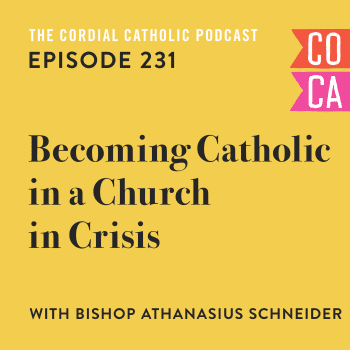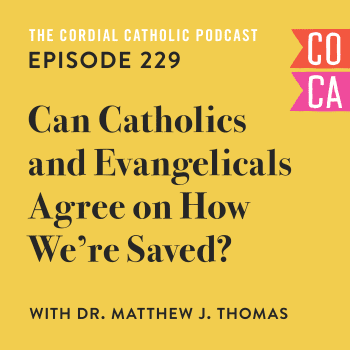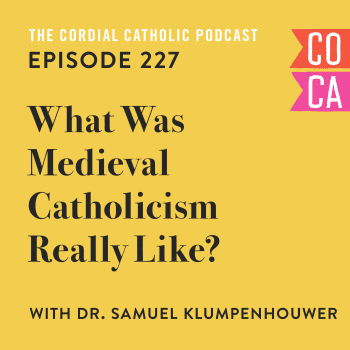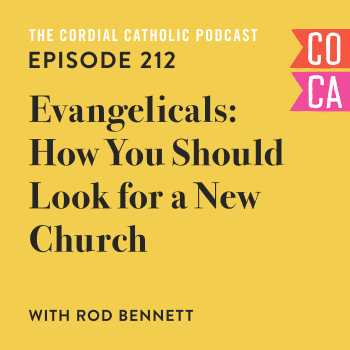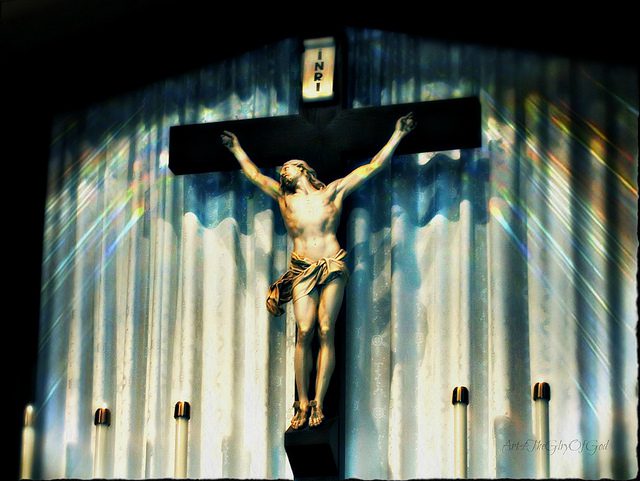
For fifteen years I was an evangelical Protestant. Then, two years ago at Easter I became a Roman Catholic.
I began thinking about the Catholic Church nearly a decade ago. Then I began reading.
First, from other Protestants who converted to Catholicism. I had questions similar to theirs. Then, from the Early Church Fathers, those closest to Jesus and His apostles, writing just after the time of the New Testament. And then, I read what Catholicism great thinkers and theologians had to say about the Church, and her teachings.
I’ve written elsewhere about some of the things that led me to become a Catholic—and that’s worth reading, too. But there’s one thing, one enormous thing, that I need to tell you, as a non-Catholic. Something I didn’t know for a long time. Something which took me a decade to come around to understanding, and it’s something that absolutely blew my mind, changed my life, and sent my faith sky-rocketing.
There is a closeness with Jesus which, as an Evangelical Protestant, I could never imagine. I can physically consume Jesus. And, what’s more, He commanded us to do likewise.
The Catholic Claim for the Eucharist
Quite simply, if you’ve never heard this before, it’s important. Of the utmost importance.
In fact, Father Mike Schmitz, in a video recommended to me by a reader, suggests that this is the most important thing people need to know about the Catholic Church.
Father Mike asserts that if he were to die, this is the one thing he’d want people to know and remember out of all his talks, sermons, and videos.
This is important. Life-changing.
The Catholic Church believes that when Jesus instituted the Lord’s Supper—the Eucharist—He meant what He said.
Through a miraculous process foreshadowed immediately before hand in the Gospel of John by the multiplying of the loaves, Jesus becomes actually present in the Eucharistic elements. Jesus is not symbolically there. It’s not a representation of Jesus or merely a memorial. In the Catholic tradition, Jesus becomes present in the bread and the wine, although hidden from our merely physical senses.
We are actually consuming Jesus in the Eucharist, like Jesus said we must.
Jesus is really there, each and every time.
Is the Catholic Claim for the Eucharist Credible?
Absolutely.
Hands down.
First of all, in the Gospel of John, when Jesus said that we must eat His flesh and drink His blood He emphasized it five times, as Father Mike reminds us. Time and again, when His followers grumbled and questioned Him He made it abundantly clear that He was speaking literally, not in a metaphor or parable. And when the crowd couldn’t take His “difficult teaching” they left—and Jesus didn’t stop them.
The crowd—Jesus’s very disciples who, Father Mike tells us, had left their families and livelihoods—took Jesus literally, and it was too much to take. They left.
The first witnesses to Jesus’s explanation of what happens in the Lord’s Supper took Him literally.
Next is the witness of the Early Church Fathers, the apostles of the apostles. Those that learned from the apostles stand as an unambiguous witness, too. Down to the very last one, those most closely linked to Jesus’s apostolic missionaries took Jesus’s words to be absolutely, unequivocally, literal.
St. Justin Martyr, one of the earliest Christian apologists, writes around the year 150AD,
This food we call the Eucharist, of which no one is allowed to partake except one who believes that the things we teach are true, and has received the washing for forgiveness of sins and for rebirth, and who lives as Christ handed down to us. For we do not receive these things as common bread or common drink; but as Jesus Christ our Savior being incarnate by God’s Word took flesh and blood for our salvation, so also we have been taught that the food consecrated by the Word of prayer which comes from him, from which our flesh and blood are nourished by transformation, is the flesh and blood of that incarnate Jesus.
These early Christians, the pillars of the modern Church, understood Jesus to be really present in the Eucharist.
Finally, there is the witness of the whole of Christianity for over 1,500 years. Remarkably, this goes largely ignored but the evidence is overwhelming.
For 1,500 years every Christian on earth was part of a Church that believed, without batting an eyelash, that Jesus was actually, fully present in the Eucharist.
It wasn’t until the Reformation, with the widespread introduction of new teachings on the “real presence” of Jesus that Christian belief began to splinter.
Either Jesus is a Liar or the ‘Real Presence’ Is True
The tragedy of the Reformation is that it split the Church into a million tiny fragments; a reality that we’re so far removed from that we don’t give a second thought to our particular denomination or set of beliefs, or even ask ourselves what are we protesting against?
But, the reality is, either the real presence of Jesus Christ in the Eucharist is true, or Jesus Christ is a liar.
Because Jesus was unequivocal when He said He was founding a Church and evil would not prevail over it. If He meant what He said how would it makes sense, as Father Mike reminds us, that His followers immediately after the apostles could got it so wrong.
The earliest Christians believed that Jesus was really present in the Eucharist. The whole of the Christian Church believed it for 1,500 years.
If Jesus meant what He said when He told us that evil wouldn’t prevail over His Church how is it possible that such a misunderstanding could creep in?
What Jesus a liar?
Did the Reformers, 1,500 years after the founding of Jesus’s Church suddenly come upon something new from God? Did God finally, after 1,500 years, reveal what He really meant when He instituted Holy Communion?
And what about all those millions of believers from the very early Christians up until the 16th century who falsely believed in a doctrine which was central to their faith? That would’ve, ultimately, amounted to idolatry if they got it wrong.
What makes more sense?
The Eucharist is the Ultimate Closeness with God
Ultimately, it comes down to what every non-Catholic needs to know. The one thing every single Christian on earth needs to hear, and understand.
In the Eucharist you can receive the real Jesus, and experience the ultimate closeness possible while here on earth.
Bar none.
The fact that Jesus is really present in the Eucharist and it was never meant as a mere memorial or commemoration is attested to by Jesus Himself, the earliest witnesses to His testimony (in John 6), the Early Church Fathers, and the whole of the Christian Church for 1,500 years.
What’s more, either Jesus meant what He said when He told us that we must eat His flesh and drink His blood, or He was a liar. Because if He didn’t mean it literally then not even a generation after His ascension evil, false teaching became the predominant norm in the Christian Church. False teaching that wouldn’t be repaired for over 1,500 years leaving countless millions of Christians destined for an eternity apart from God.
As an Evangelical Protestant logic compelled me to explore the Catholic Church, but it was passion—passion for the very closeness of God—which ultimately lead me to conversion. Because the Eucharist doesn’t only make sense logically, but it’s the ultimate closeness with God here on earth and what honest, earnest, devout Evangelical Protestant doesn’t want that?
It’s at least worth a second look. Or a first one.
Stay in touch! Like The Cordial Catholic on Facebook:








